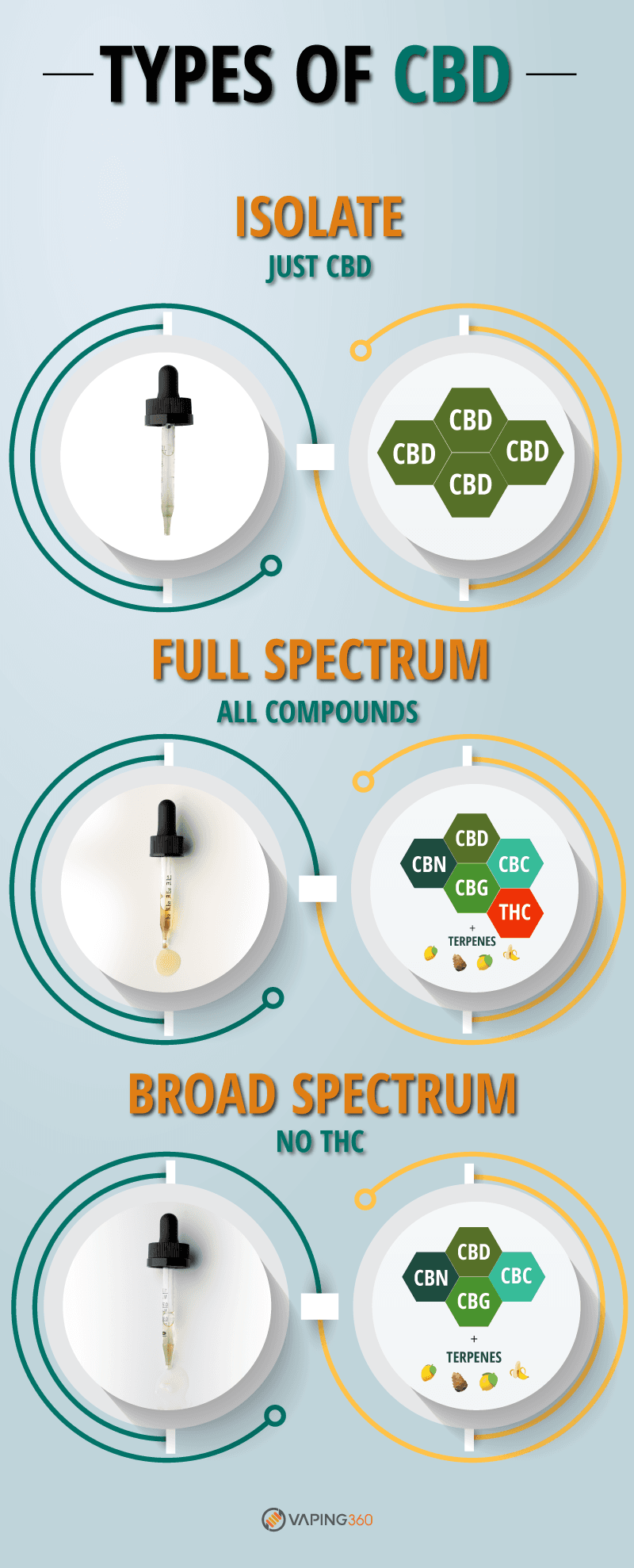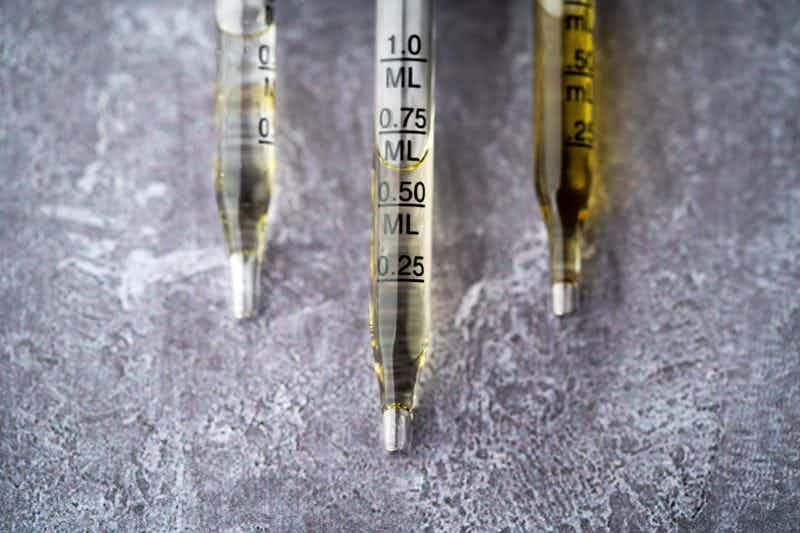CBD oil has become as mainstream as vitamins. Pharmacies to gas stations sell it. But just seeing "CBD" on a bottle doesn't mean much.
The first thing to know is that CBD products fit into three main categories: CBD isolate, broad spectrum, and full spectrum. Knowing the differences are as important as getting your CBD dosage right. Each category has different implications for the user.
CBD isolate vs full-spectrum extraction

While all types of CBD come from the same plant, there are many differences in their structure. Once the full process of extracting cannabinoids from hemp is complete, manufacturers are left with some options. They can either use the CBD-rich extract as is, or go through extra processes to either isolate or remove certain cannabinoids. Depending on the route they follow, a different type of final product will come out of the lab.
The chart above shows where the CBD extraction process diverges for isolate, broad spectrum, and full spectrum. Some steps may vary, and others may be skipped depending on the lab, but it’s a basic roadmap for understanding the process that starts with the hemp plant and arrives at the three main types of CBD.
What is full-spectrum CBD?
(see more full-spectrum CBD oils here)
Full spectrum refers to a CBD-rich product that contains the full profile of organic compounds (cannabinoids, terpenes, etc.) that can be found in the hemp plant. But to better explain what full-spectrum CBD is, let's first go through the whole process once.
First, CBD, along with an array of cannabinoids, is extracted from the plant using one of many types of extraction methods—most commonly supercritical CO2 extraction. The extract then can go through winterization, a process that removes a wide array of unwanted substances, essentially further purifying it.
Then, through a process called decarboxylation (removing a carboxyl group from the molecule), components of the extract that come in acid form (CBDa, THCa, etc.) are transformed into their active forms (CBD, THC, etc.).
For CBD bud smokers, this process takes place when lighting a joint or using a vaporizer. For every other type of CBD product, it takes place in a lab. The end result is full-spectrum CBD.
An important thing to note at this point is that while full-spectrum CBD does contain THC molecules, widely available CBD products are derived from hemp, which is naturally low in THC content.
In fact, the legal requirement for the hemp plant is to contain up to 0.3% THC, and most full-spectrum CBD products contain less than that. But note that while the THC content of hemp-derived CBD is not enough to get you high, it could potentially cause you to fail a drug test.
If you're concerned about a drug test, CBD isolate or broad spectrum is what you are after.
Full spectrum and whole plant: not the same
What is CBD isolate?
CBD isolate is exactly what its name implies: the purest form of cannabidiol (CBD). The process to obtain CBD isolate follows the same route as full-spectrum CBD, with the addition of some extra steps in order to isolate CBD from the rest of the hemp plant extracts.
Once the extract is activated after decarboxylation has taken place, it then goes through a type of distillation. The specific method used may vary, but CBD distillation is not much different from the process used for alcohol.
What remains after distillation is a white powder that's typically made out of at least 99% CBD—with the remaining 1% being traces of plant matter that could not be removed.
The final product of these processes can be bought in crystal form, or used by manufacturers to create tinctures, vape juice, and a wide variety of CBD isolate-based products.
How to use CBD isolate
What is broad-spectrum CBD?
Simply put, broad-spectrum CBD is full-spectrum CBD minus the THC. At least that's what it's supposed to be; many manufacturers tend to use the term for any CBD product that contains even one cannabinoid more than CBD.
True broad-spectrum CBD comes from removing THC from a full-spectrum extract, and chromatography is the most commonly used method for that purpose.
By removing THC from the extract, what remains is a CBD-rich broad-spectrum formulation that contains a wide array of cannabinoids, terpenes, and other organic compounds.

What’s the right type of CBD for you?
Drug tests on the horizon?
Want the most out of your CBD?
The organic compounds (cannabinoids, terpenes, etc.) contained in broad-spectrum and especially full-spectrum CBD work together to produce what's called the "entourage effect".
That's a commonly used term that was first introduced in the study of cannabinoids when scientists discovered that CBD can potentially suppress the psychoactive effects of THC. But in the process, they also discovered that regardless of THC content, CBD itself may become more effective when combined with other compounds than it does in isolation.
Isolated CBD provides its effects inside a specific range of dosage—with anything lower than that being ineffective, and anything higher than that not producing additional effects.
That's commonly referred to as the bell-shaped dose response—imagine a bell-shaped graph, with the effects rising steeply after a specific dosage, and subsiding at a similar rate soon after that.
The entourage effect seems to allow CBD to become effective at a lower dosage, and to keep raising its effectiveness at higher dosages—especially when using CBD for pain management.
Flavor and odor
Conclusion
After reading this guide, you should be able to differentiate between the types of CBD and know what type should be a better fit for your needs. As with most things, the type of CBD you choose boils down to personal preference and priorities.
Full-spectrum CBD has shown lots of promise when it comes to effectiveness due to the entourage effect, but the risk of a failed drug test is not something that should be taken lightly. Isolate on the other hand is the most versatile CBD type, but you should take care to get the right dosage if you are using it in its powder form. For these reasons, some people may find that broad-spectrum CBD combines the best of both worlds.
Whatever you choose to go with, always make sure you are buying your CBD products from a reputable source that offers third-party test results. And as always, don't hesitate to use the section below for your questions and comments.

Spyros Papamichail
Vaping for: 9 years
Favorite products:
Favorite flavors: Sweet tobaccos, fruits
Expertise in: Nicotine, beginner devices, advanced devices
Spyros Papamichail
Having quit smoking using vapes in 2016, I quickly developed somewhat of an obsession with all things vaping. I managed to turn my hobby into a full-time job, and I now work as the content manager here at Vaping360. In my free time you'll find me gaming on my PS5 or playing fetch with my dog, Buffy.


